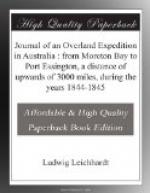Cumuli formed very early in the morning, and increased during the day, sending down showers of rain all round the horizon. The sea breeze set in at 3 o’clock; and the weather cleared up at sunset, and during the first part of the night; but after 1 o’clock A. M. became cloudy again, with inclination to rain; heavy dew fell during the clear part of the night.
Dec. 4.—The natives returned very early to our camp. I went up to them and made them some presents; in return for which they offered me bunches of goose feathers, and the roasted leg of a goose, which they were pleased to see me eat with a voracious appetite. I asked for Allamurr, and they expressed themselves sorry in not having any left, and gave us to understand that they would supply us, if we would stay a day. Neither these natives nor the tribe of Eooanberry would touch our green hide or meat: they took it, but could not overcome their repugnance, and tried to drop it without being seen by us. Poor fellows! they did not know how gladly we should have received it back! They were the stoutest and fattest men we had met.
We travelled at first to the east, in the direction from which the geese had come last night, but, arriving at ridges covered with scrubby forest, we turned to the north-east, and continued in that direction about seven miles and a half, over iron-stone ridges, when we again entered upon the plains of the river. Mountains and columns of smoke were seen all along its northern banks; but we afterwards found that most of those supposed columns of smoke were dust raised by whirlwinds. We now followed the river until a vine brush approached close to its bank, into the cool shade of which our bullock rushed and lay down, refusing to go any farther; our packhorse and most of our riding horses were also equally tired. The bed of the river had become very narrow, and the water was not quite brine, which made me hope that we should soon come to fresh water. Charley, Brown, and John, had gone into the brush to a camp of flying-foxes, and returned with twelve, which we prepared for luncheon, which allowed our bullock time to recover. They gave an almost incredible account of the enormous numbers of flying-foxes, all clustering round the branches of low trees, which drooped by the weight so near to the ground that the animals could easily be killed with endgels. The Seaforthia palm raised its elegant crown far above the patches of vine brush which we passed at the river side of the ridges.
After a delay of two hours, we again started, and travelled in a due south direction towards some thick smoke rising between two steep and apparently isolated rocky hills: they were about four miles distant, and, when we arrived at their base, we enjoyed the pleasing sight of large lagoons, surrounded with mangrove myrtles (Stravadium), with Pandanus, and with a belt of reeds and Nelumbiums. Man, horse, and bullock, rushed most eagerly into the fine water, determined to make up for the privation and suffering of the three last days. The lagoons were crowded with geese, and, as the close vegetation allowed a near approach, Brown made good use of the few slugs that were still left, and shot ten of them, which allowed a goose to every man; a great treat to my hungry party.




